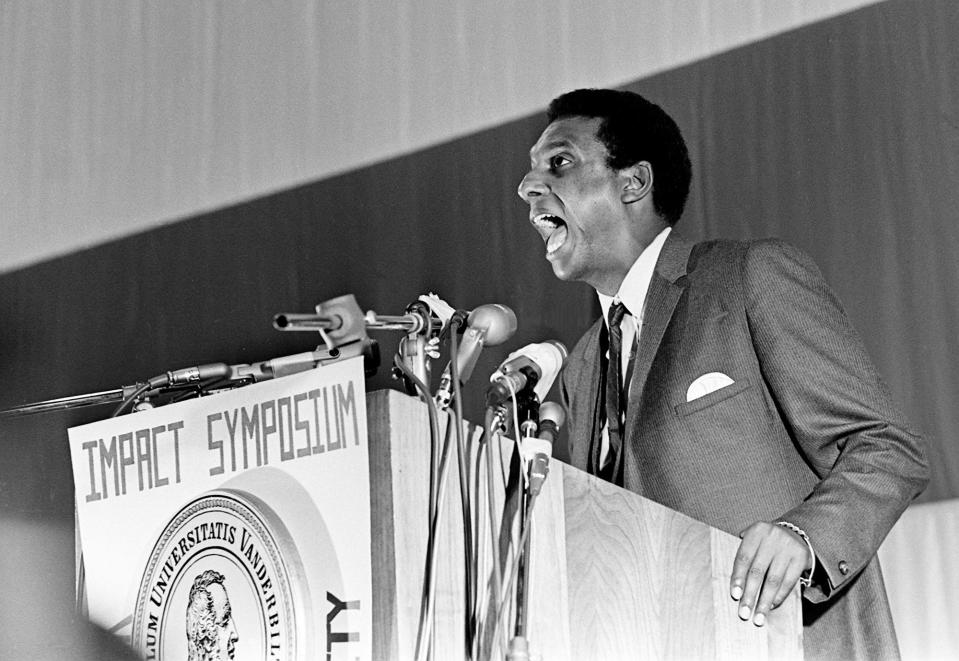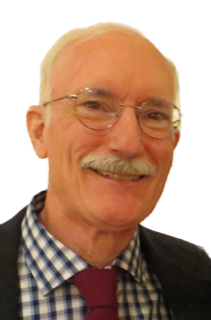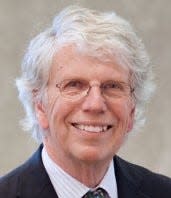Vanderbilt neutrality stance calls to mind its ultimate open forum: 1967 Impact Symposium
In a May 15 Wall Street Journal guest opinion column, former Sen. Lamar Alexander, R-Tennessee, praised Vanderbilt University Chancellor Daniel Diermeier’s “commitment to ‘principled neutrality,’ in which the college and its leadership refrain from taking positions on controversial issues that don’t directly relate to the function of the university.”
Vanderbilt provides an “open forum” to “ensure that on its campus you are free to state your position and hear others’ viewpoints.”
At a time of polarization and division on campuses and in the community, we welcome Sen. Alexander's highlighting Chancellor Diermeier’s strong leadership for a vibrant open forum. Such programs as the Vanderbilt Project on Unity and America Democracy are setting an important example of active and constructive dialogue across divides.
Senator Alexander properly points out that Vanderbilt’s embrace of the open forum originated in the 1960s.
However, his rendition of Vanderbilt’s 1960s history is incomplete and incorrect.
We know the facts firsthand because we were Vanderbilt students from 1963 to 1967 and in 1967 were chairman and vice-chairman of the premier open forum program, the Impact Symposium. The open forum was embedded in Vanderbilt policy in a series of speeches by Alexander Heard, who became chancellor in 1963. The student-run Impact Symposium was first held in April 1964 and continues as an annual major campus event.
Vanderbilt leader: Universities must uphold institutional neutrality to allow for debate
The Left did not ‘pummel’ Vanderbilt, but the Right did
Alexander states that Vanderbilt’s commitment to free expression is “a legacy from the time when I was a student at Vanderbilt. In the 1960s, the university was being pummeled from the left and right for hosting controversial speakers like Allen Ginsberg, Stokely Carmichael and Strom Thurmond.”

This statement needs several corrections:
First, Alexander was not at Vanderbilt during this period. He graduated in 1962, went to NYU law school and did not return to Tennessee until 1970.
Second. He omitted Dr. Martin Luther King, Jr., the most prominent speaker at Impact ‘67, and still controversial.
Third, Impact and the university were not “pummeled from the left.” The “left” at Vanderbilt and in Nashville was silent, even when a leading segregationist was included.
Moreover, the campus community overwhelmingly supported Impact ‘67: an audience of about 4m000 applauded the speeches by Dr. King, Ginsberg, and Carmichael (later Kwame Ture).
On the other hand, a vehement, high profile and public pummeling occurred over many weeks by vocal opponents of a Vanderbilt platform for Carmichael, an outspoken advocate for “Black Power” and opponent of the Vietnam war. It began with abusive mail and 6 a.m. phone calls. We had our telephone number unlisted.
The most prominent opponent was James G. Stahlman, the publisher of The Nashville Banner daily newspaper, also then the longest serving Vanderbilt Trustee. The Banner published a daily drumbeat of articles lambasting Heard and Vanderbilt, as well as front page editorials. The Tennessee State Senate adopted a resolution highly critical of the University.
At the May Vanderbilt Trustees meeting, Stahlman led an effort to terminate Heard as Chancellor because of Impact. He was unsuccessful.
Hear more Tennessee Voices: Get the weekly opinion newsletter for insightful and thought provoking columns.
How we got segregationist Strom Thurmond to speak on campus
We would add that the meaning of the “open forum'' for Chancellor Heard was illustrated by the invitation to Senator Thurmond, D-South Carolina (he later became a Republican).
As was his practice with speakers, this guest column's co-author Robert Eager notified Chancellor Heard after Dr. King accepted. He suggested we wait to announce this acceptance until a conservative could be added, to provide greater balance on the program.

Heard soon informed me that Senator Thurmond, the 1948 Dixiecrat Presidential nominee and a leading segregationist for two decades, was available and would accept an Impact invitation. We presented this opportunity to the 15-student Impact organizing committee, which authorized an invitation. The inclusion of Thurmond stirred no controversy.
Impact ‘67 included a total of eight speakers, selected by the student committee and, except for Thurmond, invited without prior notice to the Chancellor. The Thurmond invitation was the only time Heard took any action to secure a speaker.
Eager communicated and met with Heard at least weekly throughout the entire school year, and he never said “no” or told us what to do. He was unreservedly supportive of Impact, including its wholly independent student decision-making with respect to every aspect of the program.

As Vanderbilt alumni for whom the 1960s open forum was a lived experience, we applaud Chancellor Diermeier’s building on Chancellor Heard’s legacy and his dedication to student life enriched by a vibrant open forum in a campus environment quite different from the 1960s.
Robert C. Eager and C.F. Muckenfuss III are alumni of the Vanderbilt University Class of 1967. They were chair and vice chair of the Impact Symposium of 1967.
This article originally appeared on Nashville Tennessean: Vanderbilt neutrality stance echoes 1967 Impact Symposium open forum

